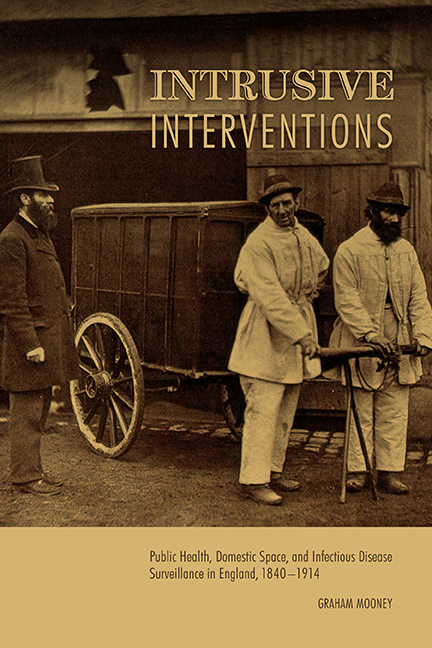 Intrusive Interventions
Intrusive Interventions Book contents
- Frontmatter
- Dedication
- Contents
- Acknowledgments
- Abbreviations
- Introduction
- Part One Making Infectious Disease Surveillance
- 1 Finding Disease in the Victorian City
- 2 “These Bastard Laws”: Infectious Disease, Liberty, and Localism
- Part Two Spaces of Risk and Opportunity
- Conclusion
- Notes
- Bibliography
- Index
2 - “These Bastard Laws”: Infectious Disease, Liberty, and Localism
from Part One - Making Infectious Disease Surveillance
Published online by Cambridge University Press: 14 March 2018
- Frontmatter
- Dedication
- Contents
- Acknowledgments
- Abbreviations
- Introduction
- Part One Making Infectious Disease Surveillance
- 1 Finding Disease in the Victorian City
- 2 “These Bastard Laws”: Infectious Disease, Liberty, and Localism
- Part Two Spaces of Risk and Opportunity
- Conclusion
- Notes
- Bibliography
- Index
Summary
In February 1882, Nottingham's MOH Edward Seaton outlined the benefi ts of infectious disease notification:
I have urged the adoption of a system of notification because by this means we should undoubtedly be in a better position to control the spread of disease. I have urged it in the case of smallpox, because we may thus get patients thoroughly well isolated and by getting the persons who are likely to be exposed to the infection vaccinated, we may stop the course of this highly infectious and terrible disease; I have urged it in the case of scarlet fever because we should be thus enabled to limit its spread by preventing children who are in an infectious state attending school, by preventing the carrying on of lace and hosiery work in the very same rooms as those in which the sick person lies, and, speaking generally by preventing other heedless and unnecessary exposure of infected persons or things; I have urged it in the case of enteric (typhoid) fever, and also diphtheria, because it would enable us to make a more searching examination of the houses and premises in which cases occur, with a view to discovering unhealthy conditions than is otherwise possible, and also because we could thus secure the efficient disinfection of those particular emanations by which the disease is known to be propagated, most frequently through the recognised channels, water, milk, or sewer gas.
In the absence of a national register of sickness, salaried public health officials up and down the country pressured their employers to legislate for infectious disease notification by GPs, which might bring all infected individuals—regardless of their economic means or occupation—under the gaze of the local sanitary department. The key words of Seaton's advocacy are “control” and “enable.” Notification afforded unprecedented accessibility to the infected and their households. Such access promised control of the diseased and the nondiseased because it facilitated the swift implementation of existing public health laws. No longer would an MOH be reliant on inconsistent and unreliable sources of information.
- Type
- Chapter
- Information
- Intrusive InterventionsPublic Health, Domestic Space, and Infectious Disease Surveillance in England, 1840-1914, pp. 40 - 66Publisher: Boydell & BrewerPrint publication year: 2015


